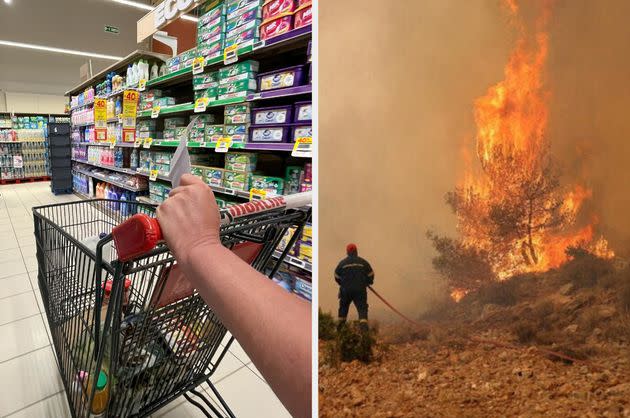The Unexpected Way Climate Change Is Already Impacting You

The climate crisis brings heatwaves, floods and extreme weather – while also worsening inflation, according to new research.
As fears that the world will not be able to limit global warming to an increase of just 1.5C, experts warn that the climate crisis is expected to worsen inflation, too.
Most countries agreed to try and prevent global temperatures to increase beyond 1.5C on pre-industrial levels by most countries back in 2015, as part of the Paris agreement.
This limit is important because exceeding it means the world may experience irreversibly climate damage, and expose millions to climate disasters.
But, after the last few weeks of dangerous heatwaves and intense floods around the world, Professor Sir Bob Watson, former head of the UN’s climate body, told BBC Radio 4′s Today programme he was “pessimistic” that world would meet that target.
Speaking on Thursday, he said: “I think most people fear that if we give up on the 1.5 [celsius limit] which I do not believe we will achieve, in fact I’m very pessimistic about achieving even 2C, that if we allow the target to become looser and looser, higher and higher, governments will do even less in the future.”
The UK government has already been scrutinised for its lack of action on green pledges since Rishi Sunak got into office.
He did not put any climate promises in his top five priorities at the start of the year, although he did vow to halve inflation.
Yet, as BBC Newsnight Ben Chu reported this week, the spike in food prices seen in the UK over the last year has been “partially driven” by global warming – otherwise dubbed “climateflation”.
The primary driver of the cost of living crisis is the Russian invasion of Ukraine, driving the price of food exports and energy bills up, leading to inflation.
However, Chu pointed out, summer 2022 was a particularly hot one (the year of record-breaking 40C heat in the UK).
And, as Carbon Brief reported last August: “Of the 152 extreme heat events that have been assessed by scientists, 93% found that climate change made the event or trend more likely or more severe.”
What on earth is so-called Climateflation?
@BenChu_ examines the evidence that global warming could be contributing to the cost of living crisis
https://t.co/P0zxS1Elwdpic.twitter.com/nziNCT9jhy— BBC Newsnight (@BBCNewsnight) July 18, 2023
Chu also said that the extreme weather of 2022 had an impact on food prices.
Researchers at the European Central Bank recently analysed the impact of last summer’s European heatwave and managed to separate its impact from the Ukraine war.
They found in 2022, it increased food inflation by 0.7 percentage points, at a time when food inflation overall hit 20%.
By 2035, they predicted climate change, would increase food inflation by one percentage point.
In 2060, without carbon emissions reductions, it would be higher still, possibly adding two percentage points on food inflation, according to those findings.
That would also work out to one percentage point overall to the national inflation – accounting for half of the Bank of England’s target 2% inflation rate.
Chu explained: “Despite Brexit, we are very much part of the wider European food system.
“Just under half of the food consumed in the UK comes from abroad, and around a quarter (28%) comes from mainland Europe.”
Chu reminded viewers how a spell of cold weather hitting Spain and north Africa over the winter left the UK supermarkets with empty shelves.
He pointed out that this disproves the arguments that the immediate policy focus should be taking down inflation – as Sunak has repeatedly said – while climate policies can sit on the backburner, as the two areas are so entwined.
Related...
While Italy Struggles In The Heatwave, Its Government Is... Erasing Mothers' Rights
Sorry But Here's What The World's Most Famous Attractions Will Look Like In 2050

 Yahoo News
Yahoo News 